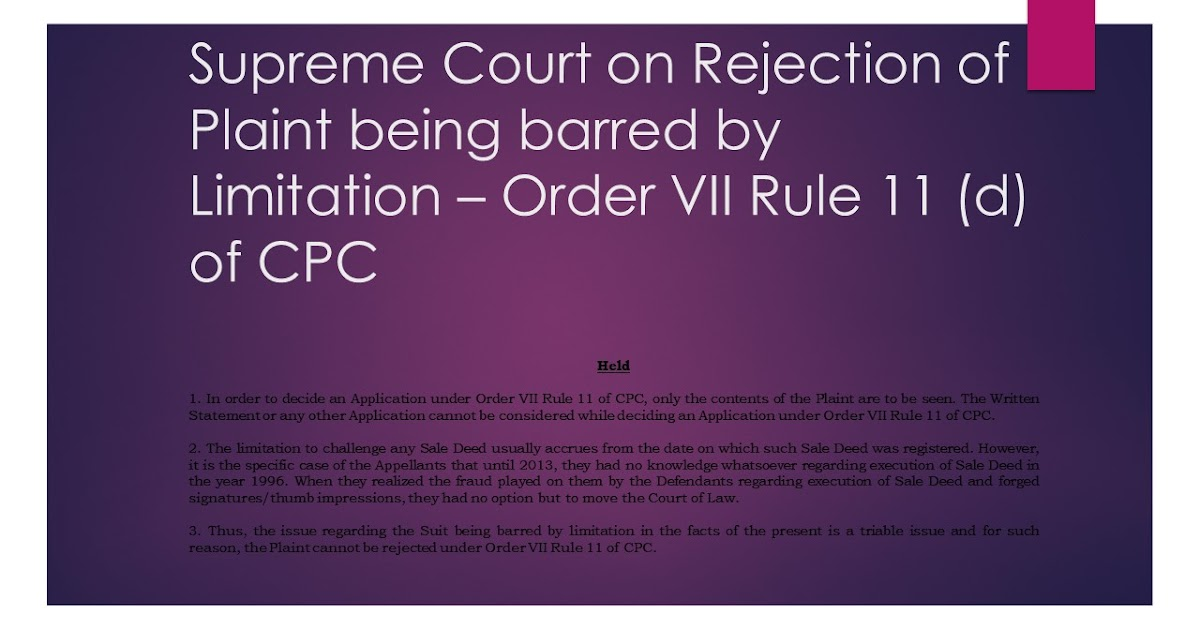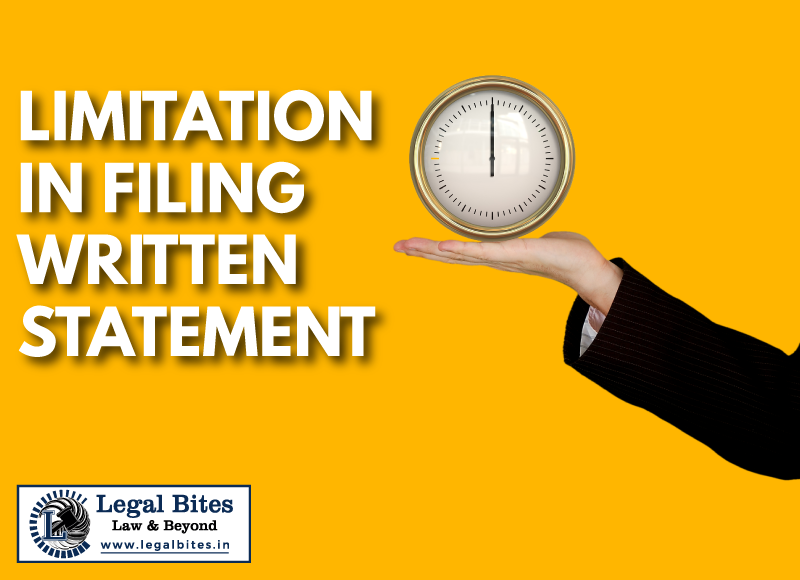Limitation: Ground for
rejection of plaint OR FOR FRAMING PRELIMINARY ISSUE
The law of limitation in a suit or proceedings are
often deliberated and debated as regards its applicability. Whether question of
limitation should be treated as a law point or a point of facts, or still further,
mixed question of law and facts. Whether on the basis of issue of limitation
i.e if a plaint is found ex facie time
barred, the provisions of Order VII Rule 11 (d) of Code of Civil Procedure
could be invoked or not? If so, whether, on that premise itself plaint could be
rejected or not ? Another dimension to that will be, when the aspect of limitation
could be treated as preliminary issue and it should be decided accordingly. Yet
another aspect could be that rather than framing a preliminary issue, the issue
of limitation should be framed for a full dress trial while deliberating all
other issues. What shall be the apt course? No doubt, there are plethora of
judgments/judicial precedents in this regard, still, there are several
convergence and divergence on the aforesaid aspect. Recently, Supreme Court has
reduced the ambiguity in a great deal while deliberating a case captioned as M/s Mongia Realty and
Buildwell Private Limited Vs Manik Sethi Civil Appeal No.
814 of 2022
Arising out of SLP (C) No 26930 of 2019.
In the above case, the ld trial
court had rejected the plaint on the ground of limitation and that was upheld
by the Delhi High Court. The original plaintiff was therefore before the
Supreme Court as appellant.
FACTUAL MATRIX OF “MONGIA REALTY”
The
plea of the appellant (Plaintiff) in paragraph 10 of the plaint was that though
two and a half years had elapsed since the date for repayment of the loan, the
respondent had failed to pay the outstanding loan amount. The appellant has
also set up the case that a running account has been maintained between the
parties in pursuance of which, the last payment was made on 24 October 2013.
Per contra, in the written statement filed by the
respondent the defence set out was that the respondent provided real estate
services to the appellant for which commission was being paid by the appellant.
It was alleged that payments made for business transactions are in a mala fide manner portrayed as loan
transactions. It was also alleged that on some occasions, payments were made
for carrying out renovation work in the properties. The respondent(defendant) has
denied that there were any loan transactions, and had set up a plea that the
transactions between the parties pertain to the payment of commission by the
appellant to the respondent in connection with real estate transactions.
The
preliminary
issue was framed on the question of limitation, but, no evidence was
adduced by the respondent/defendant. The trial Judge heard the preliminary
issue only on the basis of arguments at the Bar. The trial Judge held that the
admission in paragraph 10 of the plaint was to the effect that the last payment
was made on 20 June 2013 by the appellant (plaintiff), and since the suit was
instituted on 1 April 2017, three years delay of Nine Months and Ten days
thereafter, hence, it was barred by limitation and the plaint was accordingly
rejected.
What
is of pertinence, according to appellant/plaintiff, that in paragraph 5 of the
plaint an express plea was set up to the effect that the loan was repayable
within one year from the date of the payment of the last installment i.e, by 9
April 2014. Hence, the suit which was instituted on 31 March 2017 was within
limitation. If that is so, this is a matter which has to be tried on the basis
of evidence and could not have been disposed of purely on the basis of oral
arguments. Moreover, it was also contended that there was an open and running
current account, between the parties having been set up in the plaint and
hence, such aspect should be decided on the basis of evidence adduced at the
trial.
It
is held by Supreme Court in M/s Mongia Realty (Supra) para 12:
12
The issue as to whether the claim of the appellant is barred by limitation
cannot be isolated from the nature of the transactions between the parties. In
any event, whether the plea of the appellant as set up in paragraph 5 of the
plaint is proved would depend upon evidence adduced at the trial. The course of
action which was followed by the learned trial Judge of directing the parties
to address arguments on the issue of limitation was irregular. The issue of
limitation in the present case would require evidence to be adduced.
The
Order XIV Rule 2 of the Code of Civil Procedure stipulates that when issues of
both law and facts arise in the same suit, the Court may dispose the suit by
trying the issue of law first. For this purpose, the provision specifies two
questions of law, which are (i) jurisdiction
of the Court; and (ii) a bar to the suit
created by any law for the time being in force.
The provision is extracted below:
14(2) Court to
pronounce judgment on all issues.—
(1)
Notwithstanding that a case may be disposed of on a preliminary issue, the
Court shall, subject to the provisions of sub-rule (2), pronounce judgment on
all issues. (2) Where issues both of law and of fact arise in the same suit,
and the Court is of opinion that the case or any part thereof may be disposed
of on an issue of law only, it may try that issue first if the issue relates to
:
(a) the jurisdiction of the Court, or
(b) a bar to the suit
created by any law for the time being in force, and for that purpose may, if it
thinks fit, postpone the settlement of the other issues until after that issue
has been determined, and may deal with the suit in accordance with the decision
on that issue.]
The para 14 of the M/s Mongia
Realty (Supra) is of significance:
14
Before this Court in Nusli Neville Wadia v. Ivory Properties (2020) 6 SCC
557 , the issue was whether the issue of limitation can be
determined as a preliminary issue under Order XIV Rule 2. The three-judge bench
of this court observed that if the issue of limitation is based on an admitted
fact, it can be decided as a preliminary issue under Order XIV Rule(2)(b).
However, if the facts surrounding the issue of limitation are disputed, it
cannot be decided as a preliminary issue. This Court observed as follows:
“51.
[…] As per Order 14 Rule 1, issues arise when a material proposition of fact or
law is affirmed by the one party and denied by the other. The issues are framed
on the material proposition, denied by another party. There are issues of facts
and issues of law. In case specific facts are admitted, and if the question of
law arises which is dependent upon the outcome of admitted facts, it is open to
the court to pronounce the judgment based on admitted facts and the preliminary
question of law under the provisions of Order 14 Rule 2. In Order 14 Rule 2(1),
the court may decide the case on a preliminary issue. It has to pronounce the
judgment on all issues. Order 14 Rule 2(2) makes a departure and the court may
decide the question of law as to jurisdiction of the court or a bar created to
the suit by any law for the time being in force, such as under the Limitation
Act. CA 814/2022”.
“52.
In a case, question of limitation can be decided based on admitted facts, it
can be decided as a preliminary issue under Order 14 Rule 2(2)(b). Once facts are disputed about
limitation, the determination of the question of limitation also cannot be made
under Order 14 Rule 2(2) as a preliminary issue or any other such issue of law
which requires examination of the disputed facts. In case of dispute as to
facts, is necessary to be determined to give a finding on a question of law.
Such question cannot be decided as a preliminary issue. In a case, the question
of jurisdiction also depends upon the proof of facts which are disputed. It
cannot be decided as a preliminary issue if the facts are disputed and the
question of law is dependent upon the outcome of the investigation of facts,
such question of law cannot be decided as a preliminary issue, is settled
proposition of law either before the amendment of CPC and post amendment in the
year 1976”.
The Supreme Court has
therefore concluded in 15 M/s Mongia Realty
(Supra) that:
“ Since the determination of the issue of limitation in this
case is not a pure question of law, it cannot be decided as preliminary issue
under Order XIV Rule 2 of the CPC. Hence, we allow the appeal and set aside the
judgment of the trial Judge dated 16 August 2018 and of the Single Judge of the
High Court dated 4 September 2019. The issue of limitation which has been
framed by the learned trial Judge may be decided, along with other issues at
trial. The appeal shall stand allowed in the above terms”.
In view of the above discussion, the Supreme Court
has held in Mongia Realty (Supra) that the determination of the issue of
limitation in this case is not a pure question of law, it cannot be decided as
preliminary issue under Order XIV Rule 2 of the CPC. The appeal was therefore
allowed and concurrent judgments of trial court and High Court were set aside. The
issue of limitation framed by the learned trial Judge as preliminary issue while
rejecting plaint subsequent to that was directed to be decided, along with
other issues during full dress trial.
It
thus follows that on the premise of limitation, the plaint could be rejected, only,
if ex facie, as per the averment in the plaint and documents attached along
with plaint, the same appears to be time
barred. In such an event, a plaint can be rejected as per the principles of
Order VII rule 11 (d) of Code of Civil Procedure, but, to invoke the said principle,
prima facie the plaint should appear
to be time barred. In case, disputed facts emerged and/or contradictory pleas
are taken, the same should be treated as mixed question of law and facts and the
proper course would be to adjudicate the entire issues including the issue of
limitation in full dress trial, rather than by taking recourse to framing of preliminary
issues. In other words, framing of preliminary issues could only be
necessitated, if the substantive plea of lack of jurisdiction is raised or if the
suit may appear to be barred by law and not on the premise of limitation.
----------
Anil K Khaware
Founder & Senior Associate
Societylawandjustice.com




